Prayer
Lord God, I thank and praise you for this new day. Thank you for the gift of sleep that you gave to me last night. As the new dawn rises, I look to you for light and hope. You are the only reason I have to live, and without you I have nothing. As I open your word now, may you feed my soul, may you enlighten my eyes. I pray that you may so form my mind as to see the world in a new way – to live with the full and deep conviction that this is your world, and to experience this world as a continuing and unfolding revelation from you. I want to serve you, I want to be like you, but I have so much sin remaining in my heart constantly working against that goal. And I am so weak and frail even were my will wholly devoted to you. Please meet me know in this place of weakness, please pardon my many sins, and help me to walk in blameless in your ways. Have mercy upon me, O God. This I pray in Jesus’ name, Amen.
Reading
Gen 1:20-23.
“And God said, “Let the waters swarm with swarms of living creatures, and let birds fly above the earth across the expanse of the heavens.” 21. So God created the great sea creatures and every living creature that moves, with which the waters swarm, according to their kinds, and every winged bird according to its kind. And God saw that it was good. 22. And God blessed them, saying, “Be fruitful and multiply and fill the waters in the seas, and let birds multiply on the earth.” 23. And there was evening and there was morning, the fifth day.”
Meditation
The first lesson we learned from day five is that God’s purpose for animals is that God made and uses them to instruct, teach, and help us. In addition, as we exercise dominion over them part of our calling is to learn about them. In light of these insights, the common lesson that we gather from the creatures of day five is that God calls them to multiply. However, there is more for us to see here. And so here is the next thing I want us to pay attention to as we consider the creatures of day five. Notice another obvious lesson: God makes different kinds of animals. We see this very clearly in the text. Now the question is: what is the significance of this insight?
Throughout history, different people at different times have had different ways of classifying animals. We use categories like: warm-blooded or cold blooded; we have marsupials and monotremes (and for those of you who like reading about animals, a monotreme is actually a marsupial that lays an egg – I believe that platypus and echidna are the only known marsupials that do this). In biblical thought, however, the basic division of the animals is in keeping with the environment in which God places them. There are creatures of sky and sea (day five), and then also there are land animals created on day six. Earth, sky, and sea. So here’s the next principle I want us to take note of here: God defines creatures by their environment.
Building on this, we see furthermore that the purpose of the creatures is also specifically related to their environment. Fish aren’t commanded to fill the air – they’re commanded to fill the waters. There is a God intended link between animals and their environments. Can you see that? He put the fish in water and birds in the air, and usually the two kinds do not break those boundaries. We addressed this link earlier in our studies as well when we considered the parallel between the first three days and the second three days. Day one gives us light, day four gives us the lights of the heavens; day two gives us sea and sky, day five gives us fish and birds; day four gives us land, day six gives us the creatures of the land. There is a God-intended link between creatures and their environments.
Now, let’s tie this all together – we’ll start by considering the relationship between fish and water. What can we learn here? And how would God have this to benefit us? To start with, we’ve already learned plenty about water in our studies, and that’s important to consider as we see that there is a relationship between the creatures and their environment. We’ve learned that the water was formless and void (Gen 1:2), that in the Genesis prologue it represents a nothingness and an emptiness. Those qualities of water are not in accord with God’s purposes – he doesn’t want an empty creation, very clearly he wants to fill it. Day five speaks to that purpose as God fills the water with life.
There is another important thing to consider when it comes to water here, however, and that is that God creates out of water. Think about this. At the start, everything was water. On day one, God then spoke his intention into the creation. On day two, however, he started to form that creation, and the form was called forth from the formless. In other words, he created out of water. He made the expanse by separating the water, on day three we see something similar as he again separated the waters to bring forth the land.
So this is what we know about water to this point: the water is formless and void, and then God created out of water. So then, what we see here, and this is a key insight, is that God brings form out of formlessness. That is a fair description of what God is doing right across the six days of creation. Now it’s very interesting and significant that the seas remain a part of the earth even after the work is finished on day seven – and this brings us back full circle to talk about what we learn from the fish. As the Lord creates the sea creatures, and charges them to fill the waters, we see an abiding principle put into place: that God continues to fill the formless.
As God’s creation plan unfolds, the continuing existence of the formless waters reveal that there still remains a significant degree of uncreated potential. Notice in Revelation 21:1-2, in the new creation, the sea is no more. There is no more uncreated potential at that point, the full purpose of the creation will have been realised (though the land will continue to increase and abound in fruitfulness into all eternity). For now, however, as God fills the waters with fish, what this shows us that God intends to continue filling formless things in this world with life. That’s part of his purpose for history.
This creation principle of God continuing to fill the formless is more pointedly applied later in scripture in the salvation of souls. As history unfolds, God will call a people to himself, and he will take the formless wasteland of their souls and fill them with life, as he filled the seas with life on day five. Because that what he does! He takes formless, meaningless souls like you and me, and he fills us with life! It’s interesting, isn’t it, that Jesus’ first disciples were all fishermen? That is not a coincidence. In Matthew 4:18, as Jesus calls the disciples to follow him, we read: “While walking by the Sea of Galilee, he saw two brothers, Simon (who is called Peter) and Andrew his brother, casting a net into the sea, for they were fishermen. And he said to them, “Follow me, and I will make you fishers of men.” And are we not the result of that call?
Be ye doers of the word…
Disciples of Jesus have always been fishers of men, and as we fish for men with the gospel God continues to unfold the purpose revealed on day five: filling the formless. Only now what was pictured in the seas on day five becomes a reality in the souls of men, women, and children. God fills the formless, and he still calls us today. He gave those fish the capacity to multiply, and so too he gives that capacity to us. Whether it be by literally having children and raising them in his ways, or by fishing for the souls of men with the message of the gospel. God still calls us to multiply, he still calls us to be fishers of men. How is your tackle box looking? Have you been fishing lately? God’s will for us is to fish for men, to disciple them and, through us, God will continue to fill the formless. SDG.
Prayer of Confession & Consecration
Lord, as I ponder your purposes and design on day five, I can see that your desire is to fill formless things with life and blessing. That is pictured in the way that you filled the formless seas, and in the way that you made your disciples to be fishers of men. O Lord, I pray that you would help me to put my heart and hands into this purpose as well, and to see life multiply and abound in formless places. Lord, may you fill the formless void of my heart with life, and may you help me to be a fisher of men, always seeking to draw some soul to Christ. I pray for the children of the church, that they too would multiply and be raised in your ways – that life may abound in that way also. May you move the hearts of your people to have many children, and equip them to raise those children well. I commit this day to you, I look to you for all my help and strength. In Jesus’ name, Amen.

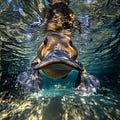




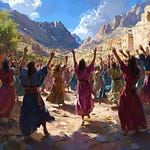

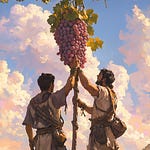
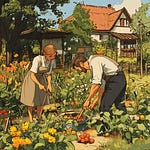
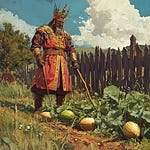



Day 25: God fills the waters (Gen 1:20-23).